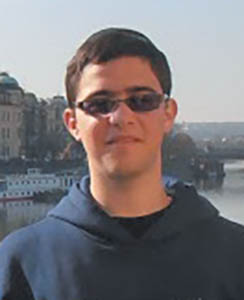
In our sedra, as famine hits Canaan, our forefather Yitzchak is forced to leave his promised land for the more fertile countries to its south. He gathers up himself, his wife, sons and all of their belongings, and heads off to Gerar. All of a sudden, Hashem appears to him in a dream and warns him: “Do not go down to Egypt… settle in this land and I will be with you and bless you.” (26:3)
While it was clearly important for Yitzchak to avoid Egypt (his parents and Pharoah have a complicated history, to say the least, not to mention Rashi’s position that Yitzchak had the status of a korban and could not leave Israel), it doesn’t seem as if this was his plan—in fact, the preceding pasuk reads: “And Yitzchak went to Avimelech, king of the Philistines, towards Gerar (Gerara).” So, what can we learn from Hashem’s warning to Yitzchak to remain in Gerar and not to travel on to Egypt?
Ramban and Radak, presenting a p’shat approach, both explain that Yitzchak was journeying to “Gerara” (toward Gerar), not that he was already there. This is like telling a friend that I am driving on Road 1 toward Tel Aviv—it could mean that I’m planning on visiting the Armed Corps Museum in Latrun, catching a flight from Ben Gurion International Airport in Lod, on my way to a lunch date in the city’s Sarona Market, or driving in the direction of Tel Aviv to continue on the Ayalon Highway north toward Cesarea (though most locals of the Gush Dan would laugh at you and hang up the phone if you told them you were planning on doing that). Each of these are the equivalent of “Gerara,” according to Ramban’s interpretation, as Hashem had caught Yitzchak en route to the Plishti capital.
Nachmanides elaborates that our forefather’s plan was to settle in Gerar for a little bit and see if his family could be sustained there, as the famine was less severe. If they could, Yitzchak would settle in the land of his father’s ben brit (which God had also promised to his descendants), but if they could not, Yitzchak would continue down the southbound trade route toward Egypt, where the famine was not even felt.
Instead, Hashem warns Yitzchak to remain in Gerar even if it would be less comfortable, for the Plishti land would eventually become part of Eretz Yisrael, and, to paraphrase Rav Chaim Volozhin’s famous observation on the story in Parshat Vayeshev of Yosef and the pit full of scorpions, it is better to remain in Israel in apparent physical danger and discomfort than to leave for chutz la’aretz.
This was especially true for Yitzchak, for, as we’ve said above, his near sacrifice to Hashem put him on a very high level that did not allow for his leaving the boundaries of Eretz Yisrael. So, as a result, Yitzchak’s journey Gerara terminated in Gerar, and, as we read in the following pesukim, our forefather was able to support his family and became very successful from this endeavor—Hashem truly blessed him for remaining in the land promised to him during this difficult time.
The Land of Israel has been described in many different ways throughout the many books of Torah, Talmud, Halacha, Rishonim and Acharonim. However, there is one metaphor that I feel very comfortable assuming has never been applied to the Holy Land in Jewish scripture, yet is nonetheless exceedingly accurate: Eretz Yisrael is the Wild West. This is hardly surprising, considering the small country is smack in the middle of Sunnis and Shiites, and, throughout history, has separated Christians and Muslims, Ottomans, Nazis and Allies. Furthermore, its geographic location on an active tectonic plate ensures that there is never a still moment (no pun intended), from devastations both earthly and Godly.
In the five years, three months and eight days that I’ve been able to call Israel my home, I can attest to having been present for three military operations in Gaza (and the preceding rocket fire), two serious droughts, countless rain and snowstorms that have disrupted life and caused dangerous power outages, and, most recently, the arson-instigated outbreak of forest fires throughout the country last week. During these trying periods of times, I’ve taken to speaking to Israelis of different shapes, sizes and stripes to see how they choose to react.
While their proposed solutions varied (mainly between military action, aggressively pursuing peace, or just praying to God and hoping for the best), virtually everyone could agree on one point: they are never leaving. Nekuda (period). Eretz Yisrael, the Wild West, which never seems to have a dull moment, is our Wild West. It is the bracha that our forefathers Avraham, Yitzchak and Yaakov were promised for their descendants to live in forever. It is the land inherited from God and rebuilt by the blood, tears and sweat of our modern-day Jewish people.
One cannot look at the beautiful land that is back in our hands now, the parkland of Emek Ayalon around Latrun, the modern, growing, metropolis of Tel Aviv, the ancient mountains of Yehuda and Shomron and, of course, our nation’s eternal capital of Jerusalem (to which Chazal famously attributed 90 percent of the world’s God-given beauty), without wanting to scream “Am Yisrael chai.” Eretz Yisrael is our light, our night, the color of our blood—it is an essential part of who we are.
In the face of forest fires, famine and drought, rocket barrages and wars, there is no other option—we do not leave its boundaries. We will pick ourselves up, rebuild and continue living the dream of Avraham, Yitzchak and Yaakov.
By Tzvi Silver/JLNJ Israel
Tzvi Silver, a Teaneck native, has been living in Israel since 2011. He is in his final year of studying electrical engineering at JCT-Machon Lev in Jerusalem, works as an investigator for Israel’s Ministry of Justice and serves as JLNJ and JLBWC’s Israel correspondent.










